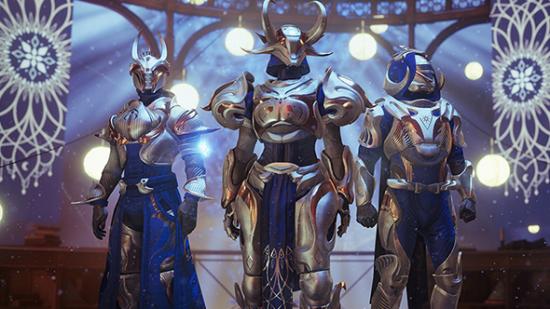What if I told you that I’ll pay you five British pounds at the end of this article?
That would be what management psychologists call extrinsic motivation: you are now compelled to finish a task because of a reward external to it. It works best in boring jobs, like getting you to flip more burgers per hour (or read articles about management incentive theory). By contrast, some tasks might be interesting enough that you will do them voluntarily – your motivation in such cases is intrinsic to the task itself.
Let our guide to Destiny 2’s Dawning event help you spread some Christmas cheer, or be a Grinch and read about all the ways it has gone wrong.
I bring all this up because I have returned to Destiny 2, and not for the first time, it has reminded me of my master’s thesis, which was thrillingly called ‘toward management incentive systems sensitive to intrinsic motivation’.
Destiny 2’s Curse of Osiris DLC adds the Infinite Forest, a new area that could have been a neat idea, but instead exhibits Destiny at its most vapid. It is an open space that is filled by floating chunks of terrain, each apparently spawned at random. I say ‘apparently’ because I can’t see a meaningful difference from one chunk to the next. Some chunks require you to kill a bullet sponge to progress, but that’s about it.
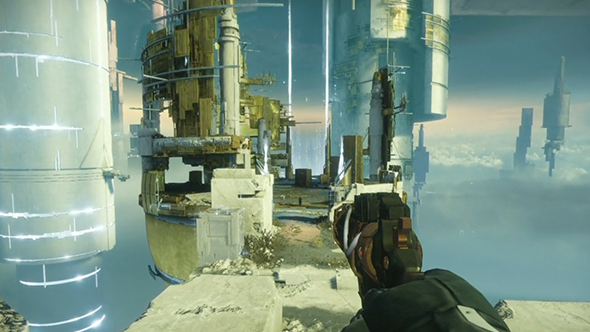
When it is this basic, Destiny’s combat is very easy and very dull. Apart from a brief pause to kill the occasional gatekeeper, there are neither carrots nor sticks to prevent me sprinting past all enemies and onto the next chunk. I am not exaggerating when I say each run through the Infinite Forest is among the most uninteresting time I have ever spent in a game. Most of my brain was drifting elsewhere, and it often wondered: why am I doing this? Why am I doing something so boring?
I play shooters like Doom and Wolfenstein for the adrenaline and the power trip. I play games like Civilization, Total War, and Portal for the more ponderous test of thinking strategically and navigating intermeshing systems. I play RPGs like Divinity and the Witcher for a mix of escapism, storytelling, and aesthetics, while Dark Souls adds thrilling difficulty and an inimitable, deliciously grim atmosphere. A consistent thread might seem hard to find, but there is one: I play all these games for the experience in itself. That is not how I feel about large tracts of Destiny 2.
Destiny 2 does have some intrinsic merit: the shooting feels great, the environments are beautiful, andsomeof its content – PvP and the raid – is challenging. But, as a hobby game, it is intended to be played for hundreds of hours. This cannot be done without repeating content; if everyone uninstalled it after one or two raid runs, Destiny 2 would die. The intrinsic appeal of any task erodes with over-familiarity, so if you cannot keep the content fresh, you need another incentive. To some extent, you need rewards.
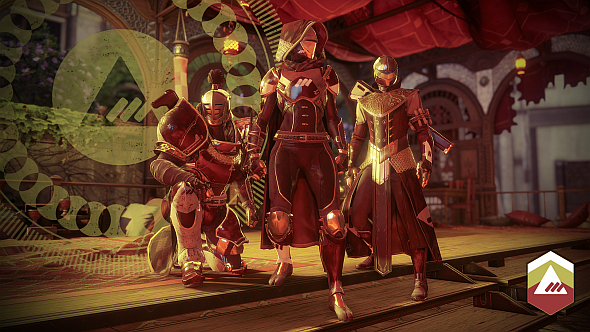
Such rewards have no worth outside of the game – unless you are happy to sell your Blizzard account – but they are still external to the task and, thus, are extrinsic motivation. When I sprint through the Infinite Forest, ignoring everything in it, or when I jump into the strike playlist, which racks up a random series of missions, it is because I want the loot, not because I really want to play whatever I am about to play. That seems odd to me.
I know what you are thinking: this is nothing new. Quest rewards have been A Thing in games for as long as they have existed. But they have a particular prominence in loot-driven games, such as Diablo, Destiny, and Borderlands. In the favourite games I list above, rewards are often unique in each playthrough, and may not even be all that useful. Most of the more outlandish weapons in Dark Souls are more bark than bite, and, depending on your build, you may not even be able to wield them.
My point is that, in the blend of intrinsic and extrinsic motivation that most games employ, the skew has historically been toward the former: designers have aspired to make a fun gamerather than one with a compelling reward economy. Now that everyone in triple-A wants a hobby game – either a direct Destiny competitor like Anthem or The Division, or one that can capture an audience in a similarly persistent way – that trend is inverting.

A few things follow. As is probably obvious, studies consistently show that people enjoy intrinsically motivated tasks more. Stands to reason, right? By definition, you are doing a task for the joy of the task in itself. People will do a crossword voluntarily; they don’t need to be paid. What is more surprising is that several studies found that if they arepaid, extrinsic motivation ‘crowds out’ the intrinsic: people associate the task more with the promised reward than with the pure joy of doing it.
This can erode the sense that you are in control of events, causing you to feel manipulated or frustrated by the whims of outside forces – like RNG, for example. Recent changes to Destiny 2, which enable players to purchase specific armour pieces from vendors rather than rely on RNG to complete their favourite set, are clearly made with this in mind.
It is a welcome change – though the original game had this feature from launch, and did not require players to unlock each armour piece through grinding, but never mind. Many Destiny players are still angry, and a look at the cosmetics-filled Eververse loot boxes will tell you why: this remains the domain of RNG. You can get any of the weekly featured content with Bright Dust, which you can get from loot boxes or from dismantling certain unneeded cosmetics. But the drop rate from gameplay is such that Bright Dust prices are pretty steep, even if you dismantle a lot.
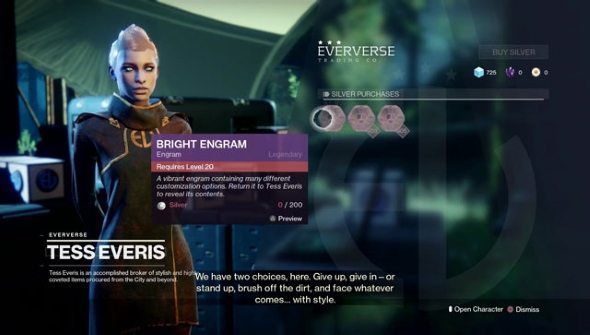
Cosmetics have also been pushed right to the front of Destiny 2’s reward economy. There is much less power difference among your equipment compared to the original game – rewards from all end-game activities, even the raid, have been squashed into the same tier, and gear perks are far less meaningful. Making your Guardian look hot has always been an important part of Destiny’s appeal, but now it is practically the only thing to do in the endgame. This is deliberate, as game director Luke Smith intimated back when single-use shaders were the game’s biggest outrage:
With D2, we want statements like "I want to run the Raid, Trials, or go back to Titan to get more of its Shader" to be possible. (4/4)
— Luke Smith (@thislukesmith) September 7, 2017
Add to this the fact that all of the prettiest gear from Curse of Osiris andthe Dawning has gone into the loot boxes, and you can see why Destiny 2 players feel manipulated. Between blue mods that can be dismantled into components to make actually useful purple mods, and Ghost Shells with useful PvE gameplay perks, Bungie have even begun flirting with the crucial line that is ‘pay-to-win’.
We are only going to see more hobby games, so let’s hope they learn from Bungie’s mistakes with Destiny 2. I know defining a game is difficult, but I would suggest being intrinsically valuable is a key property – doing something dull for rewards alone is more like work. A reward system can either support or smother that intrinsic value. Whoever manages to do the former will dominate this lucrative genre.
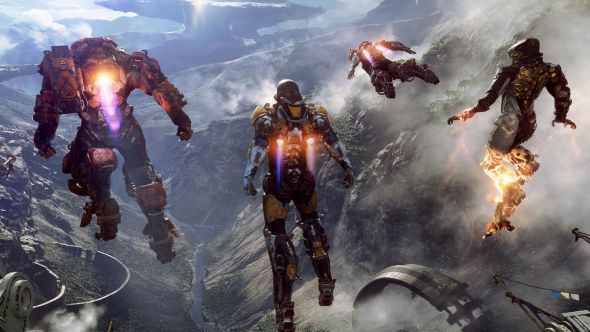
Looking back over my thesis, I see my proposal for managers was to agree a series of subjective performance goals through negotiation with employees, thus preserving their sense of control over what was being asked of them. Perhaps Destiny 2 was trying to do this by flattening its activities into the same reward tier, so you can play how you want. The trouble is that undermines weightier activities, like the raid. It seems Bungie intended their infamous XP throttling system to address part of that imbalance, which it technicallydid, but in a manner so thunderously stupid that I can still see the ripples in my coffee. These are basic mistakes that the next ‘Destiny killer’ does not need to make.
Fingers crossed, eh? And well done for making it through all that. I am not going to give you that five pounds, but hopefully you have a sense of ‘pride and accomplishment’ for reading an article on what, to some, might be a boring subject.
